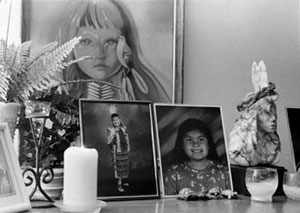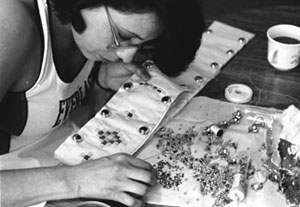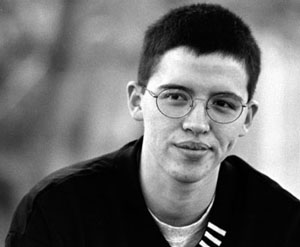 |
Pride and Prejudice
Prejudice and stereotypes
often confront
Indians who move off the reservation
Story by Katie Oyan
Photos by Amy Zekos
Twelve-year-old
Mandi Henderson likes Washington Middle School because of the
opportunities it yields, like being able to play the cello in
the school's orchestra.
What she says she doesn't like is being called a "dirty
Indian" and a "prairie nigger," and told that
she doesn't "belong on this earth."
She moved to Missoula from the Blackfeet Reservation two years
ago, and what Mandi says she misses most is "being around
people that are like me."
"There's more stuff to do here," she says. "But
I don't get treated bad in Browning."
Whether it's in-your-face name calling or more subtle forms
of discrimination encountered when trying to rent a house or
get a loan, Montana's Native Americans, who comprise more than
6 percent of the state's population, routinely suffer the humiliation
of racism.
Mandi's mother, Glenda Gilham, will graduate from the University
of Montana with a degree in social anthropology this spring.
Like her daughter, Gilham has few non-Indian friends in Missoula.
She feels comfortable going anywhere she wants on the reservation,
but she and her two daughters don't go out on the town much in
Missoula; they rarely go to movies or out to dinner because of
discrimination they say pervades much of the city.
"It's subtle things - how we get looked at and spoken
to, or not spoken to," she says. "Sometimes we just
get outright ignored.
"We feel alone and apart from society in Missoula. I never
realized how bad it was until I had to leave my comfort zone."
Gilham and other members of Missoula's Indian community feel
that business owners, especially, label them with stereotypes.
They say that clerks watch Indians because they believe they
are more likely to shoplift.
Janet
Robideaux, an organizer at Missoula's Indian People's Action,
says: "Nobody looks at me and says, 'I bet that she has
a master's degree in psychology.' They look at me like I'm going
to take something. They see brown skin."
Gilham has the same reaction. "When we go shopping somewhere,
why do they follow us so much?" she asks. "We contribute
a lot to these communities in Montana. Nobody stays home when
they get paid, they all head out and blow their money, but yet
we're treated so low."
While shopping at J.C. Penney in Missoula's Southgate Mall
about a year ago, former Big Pine Paiute tribal chairwoman Cheryl
Smoker says a clerk asked her, "Can you really afford this?"
Rob Kruckenberg has been the manager at J.C. Penney since February,
and he says there have been no discrimination complaints during
that time.
"We don't discriminate in terms of employment or service
on race, creed, religion, you name it," Kruckenberg says.
"We have a strong anti-discrimination policy, and all our
employees go through anti-discrimination training."
Gilham says her encounters with racism are not confined to
Missoula. Three years ago she tried to rent a motel room in Great
Falls. The vacancy sign was on, she says, but when she went inside,
the woman at the counter told her no rooms were available. Her
husband, Oren, who is half Blackfeet and Cree and half Irish
descent and is more non-Indian in appearance, went into the motel
immediately after Gilham was rejected. The clerk rented him a
room.
That's not unusual, Native Americans report, though few confront
those they say offend them. Cheryl Smoker has.
Smoker moved to Missoula from the Big Pine Reservation in
California more than three years ago with her two daughters,
Kree, 7, and Kylee, 14, and her mother. They say that since the
move they have encountered discrimination not only at businesses,
but also at a school and from police officers.
Smoker says Washington Middle School ignored her family's
cultural values during a period when Kylee was very ill. She
says the school excused absences when Kylee went to see a doctor
and was hospitalized, but would not excuse absences to let her
see a traditional healer. According to Smoker, a school counselor
told her that since Kylee already had too many absences, Smoker
would be prosecuted for taking her daughter out of class to see
a healer.
But a Washington School counselor expressed surprise at those
allegations.
"I can't imagine that would be the case," says Carol
Marino.
Marino says such absences are normally considered medical appointments,
and as long as a parent calls or sends a note, the child will
be excused.
"But there are kids who miss a lot of school that we
watch very carefully," she says.
Never having lived off the reservation before, Kylee had difficulty
adjusting. In addition to problems with her school, during her
first year in Missoula, Kylee, who normally dresses in Nike clothes
and baggy pants, says she was stopped by a police officer and
asked what gang she belonged to.
The incident occurred at about 8 p.m. one night a couple of
years ago, Kylee says, while she was playing basketball with
some Native American friends at a neighborhood court. Kylee says
the policeman stopped and asked them what gang they belonged
to and whether they were "going to rob again." Kylee
and her friends denied being part of a gang, and the officer
left, she says.
"They didn't have any proof," Kylee says. "I
felt really insulted."
Kylee and her mother, and several people who spoke at a recent
meeting between the city police and the Indian People's Action
(IPA) allege Native American youths have been targeted by cops
as being gang members.
Missoula
Police Chief Pete Lawrenson says he believes the complaints made
at the meeting were not entirely unfounded, but he doesn't think
his officers intentionally discriminate against anyone.
"Kids and cops always have an adversarial role, whether
they're Native American or any ethnic group," Lawrenson
says. "We have to be extremely aware of how easy it is to
be discriminatory against young people in general, regardless
of ethnicity."
Part of the problem, IPA members say, is that there are no
Indians on the Missoula police force.
Gale Albert, head of recruitment for the Missoula police department,
says there is no discrimination in the process of hiring officers,
but few minorities show up for testing.
Many Native Americans are hesitant to apply for municipal
and police positions because they don't feel they have a chance,
according to Ken Toole, program director of the Montana Human
Rights Network. Toole feels this is due to low self-esteem that
comes from a lifetime of rejection and discrimination. Also,
Toole says that Native Americans receive the message that people
in city positions are among those who discriminate against them,
and "Who wants to work with people who have stereotypes?"
Albert says Native Americans have no basis for such assumptions.
However, Robideaux says, "the word on the street is if you're
Indian, don't bother applying."
According to Lawrenson, the Missoula Police Department is
serious about recruitment efforts and bridging the gap between
the force and the Native American community.
"We're not just blowing smoke at them," Lawrenson
says. "We're as serious as we can be about this.
"We've written to all seven tribal colleges and asked
to participate in their career fairs. We want build the confidence
and trust that we'll give them a chance. Recruitment will come
naturally as we build the confidence level."
Lawrenson is also organizing diversity training courses with
IPA for police supervisors and officers, to begin possibly as
soon as September.
After problems with her school and the incident with the police,
Kylee packed up and returned to California to live with her father.
"That was probably the hardest time for me because we'd
never been apart," Smoker says. "It made me mad. I
felt like the city was not kind. Missoula took her away from
me."
Kylee came back to Missoula to live with her mother, but she
now commutes daily 100 miles round-trip by bus to Two River Eagle
School in Pablo, a tribal-operated school comprised entirely
of Indian students.
Unlike many Native Americans who return to reservations after
facing discrimination in cities, Smoker and Gilham have stuck
around.
"We have a right to be here," Smoker says.
Racism
that goes beyond name-calling and stereotypes can be harder to
shrug off.
In a test for discrimination in Great Falls housing in the
late 1980s, more than 50 percent of the Indians who participated
were treated differently by landlords than were whites. They
were asked to pay higher rents and deposits, and given limitations
not placed on other tenants, such as being allowed to have only
one car, and being warned not to crowd the house by letting extended
families move in.
Les Stevenson, executive director of Opportunities Inc. in
Great Falls has seen positive changes in his community since
that study. He feels that some forms of discrimination, like
in housing, have decreased due to a citizens' committee, the
Indian Action Council. Comprised of city officials and Native
American community leaders, the committee opened communication
and addressed sensitivity issues that had been ignored during
the 1960s through the 1980s. Although it didn't completely eliminate
the problem, an effort was made to educate the business community
that "just because they're Native American doesn't mean
they're a thief," he says.
Great Falls now has a fair housing officer and a landlord
association striving to maintain consistent deposits and applications.
A Realtors association is helping Indians in Great Falls become
homeowners.
However, critics say they fear housing discrimination in getting
worse statewide.
The number of complaints filed by Native Americans with Montana
Fair Housing almost doubled (from 37 in 1996 to 69 in 1997) in
the last year, according to Executive Director Sue Fifield. She
says a majority of these complaints came from urban areas near
reservations, such as Missoula, Great Falls and Billings. Fifield
expects these numbers to continue to increase.
Toole believes the numbers are higher than reported.
"You have to be careful when you look at statistical
analysis of complaints," Toole says. "A lot doesn't
get reported, because many times the victim doesn't know they've
been discriminated against."
This occurs when an Indian wants to rent a home, and the landlord
claims it has already been taken, or when the application process
or deposit is different, and the Indian applicant has no way
of knowing.
Assuming the victim is aware of discrimination, Toole says that
because the process of filing a complaint is intimidating and
time-consuming, many victims are not willing to take their complaints
to a formal level.
A contributing factor to the problem lies in Native American
upbringing.
"They're not from a cultural background that encourages
them to get involved with the legal process," Toole says.
"It can be confrontational and accusatory, and that's not
the Indian way of doing things."
Robideaux says that like many Native Americans, she was raised
traditionally to be soft-spoken. As a youth, her grandfather
taught her to take pity on racists.
"But I'm tired of setting the example; I want people
to get this," she says.
An example of the type of complaints that comprise the Montana
Fair Housing statistics is a 1994 case in which Richard and Donald
Lee, owners of Lee Apartments in Billings, were accused of discriminating
against Native Americans by denying them apartments based on
their race and national origin.
The case ended with the Lees paying a total settlement of
$65,000, which was divided among the 12 individuals who filed
complaints, a now-defunct group called the Concerned Citizens
Coalition and the United States government.
"You can't defend yourself against someone when they
do that to you," says Donald Lee, who was born and raised
on a reservation and says he had many Indian friends and never
discriminated against them.
"There were 36 government people working on the case,"
he says. "And they coached the testers on what to say."
Lee says his attorney told him he could prove Lee didn't discriminate,
but taking the case to court would cost around $100,000.
"We settled out of court because the debt was so high
we couldn't afford to defend ourselves," he says.
Lee says, however, that he was constantly filing complaints
with the police because of the unruly behavior of Native Americans
who lived in his apartments.
"My brother told one of the Indians, 'You fellows get
your money from the government and you go to the Lobby Lounge
and get drunk and come over and pee in the halls and poop in
the halls.'"
"But we rent to anybody now," he says. "We're
afraid not to."
Robideaux thinks that one of the causes of discrimination
is a lack of education about Indian people.
"We're almost to the new millennium and we still have people who believe we get that government check every month," Robideaux says.
"Unless people stop believing that, discrimination will
continue."
Wyman McDonald, Montana's coordinator for Indian Affairs, believes
this problem begins in the state's public education system. He
says children should be taught Native American history, so that
both Indians and non-Indians can develop an understanding and
appreciation of Indian culture. Indian children should not be
left on their own to find out about it, he says.
"Government classes start in about fifth grade or so,
and they express negatively what tribal governments are doing,"
he says. According to McDonald, the negative impression and criticism
Indian children get from school extends into their lives, causing
them to develop self-esteem problems.
Nineteen-year-old Jeremy MacDonald, an enrolled Chippewa Cree
from Rocky Boy, says he learned American history in high school,
but didn't have an opportunity to take a Native American history
class until he became a student at the University of Montana.
"We should be learning about how we lost our land, instead
of how the other people got it," MacDonald says. "If
mainstream society were more educated (about Indian history),
they would understand us more."
Now that he's in college, MacDonald is learning as much about
Native American history and politics as he can, so that through
education he can help preserve "the old ways" as a
teacher, a coach and a role model to Native American children.
"Indians are fighting to hold on," he says. "We're
trying to get back our pride."
Gilham and her daughters continue struggling to maintain their
pride in the face of racism on a daily basis. They avoid certain
stores and restaurants where they know they'll be mistreated,
and they know by word-of-mouth the places where they will be
welcome, or will at least be allowed to cash a check.
Gilham says they're "getting used to it."
"We just want to walk through life like everybody else," she says. "You have to try not to wear (discrimination) like a cloak."
|
|
 |
| Since Cheryl Smoker moved with her mother and children to Missoula, she says the sacrifice is exposing her kids to urban life "without the comfort of family." The mantel in their small apartment tells stories of their lives and the uniqueness of their culture. |
 |
| Since urban life has brought racism into the daily lives of Glenda Gilham and her two youngest children, they tend to spend a lot of time at home. Lately, outside of her classes at The University of Montana, Gilham has spent most of her time doing detailed beadwork. |
 |
| Kree Smoker, 7, shows off the sash and crown she won for being the best traditional pow-wow dancer in her age group. |
 |
| Beaded jewelry is a part of the traditional pow-wow dance costume. Kylee Smoker, 14, shows her more modern approach to the ceremonial garb with a Nike swoosh and Chicago Bulls mascot. |
 |
| "We should be learning about how we lost our land, instead of how the other people got it," says Jeremy MacDonald. |